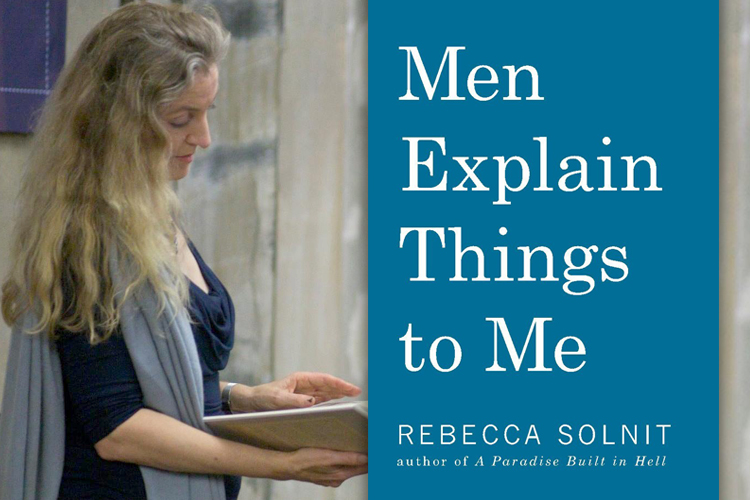I remember asking my mom when I was little, “Why do I have daddy’s name and not yours?” My mom (who is undoubtedly one of the strongest feminist influences in my life) wrestled with how to answer this question to an eight-year-old with no knowledge of the terms “patriarchy” or “sexism.” So she gave me the easy answer – “Because that’s just the way it’s been all this time.” I could tell that this was not the answer she wanted to give me, but the only one she could offer.
Rebecca Solnit considers this question and more in a collection of several essays discussing gender, patriarchy, and inequality in her newest book Men Explain Things To Me. You may have heard of Solnit after she posted her now famous essay about her encounters with “mansplaining” that launched the word into common knowledge and several “best word of the year” lists. Mansplaining is essentially when a man explains something to a female while automatically assuming she has little to no knowledge of the topic and that her capacity to understand is inferior to that of his. It comes from a place of condescension and superiority, and Solnit points out that women face this kind of treatment every day in different contexts such as women who are “academically mansplained” to.
While many people may brush it off as trivial, Solnit does a wonderful job of articulating the implications of this social phenomenon. It seems fairly innocuous, but it’s so ingrained in our society that we don’t notice it or speak up about it. But it’s a problem that’s indicative of a much larger, more flawed social system. It’s the silencing of women that “keeps women from speaking up and from being heard when they dare; [it] crushes young women into silence by indicating, the way harassment on the street does, that this is not their world. It trains us in self-doubt and self-limitation just as it exercises men’s unsupported overconfidence.” She incorporates anecdotes from her life and her experiences that have ranged from demeaning to humiliating.
A common thread throughout her essays is the various ways women are silenced by society. She covers important topics like domestic violence, rape, and marriage equality. A particularly beautiful essay entitled “Grandmother Spider” discusses the erasure of women. It’s one of the more ingrained aspects of patriarchy that we don’t consider all the time—how women are not included in the lineage of our families. “Fathers have sons and grandsons and so the lineage goes, with the name passed on; the tree branches and the longer it goes on the more people are missing: sisters, aunts, mothers, grandmothers, great-grandmothers, a vast population made to disappear on paper and in history.” The “business of naming,” a testament to the exclusion and erasure borne by women, also begs the question of just how many women and their contributions and legacies have been erased from history?
Solnit also discusses the future of feminism, comparing it to Pandora’s box; we shouldn’t be discouraged by obstacles (those trying to put us back in the box) because the ideas of equality have been released and spread and there is no way opponents can truly erase that. The one thing we can do is avoid complacency and continue advancing through solidarity and conviction. Solnit encourages hope. “Young feminists are a thrilling phenomenon: smart, bold, funny defenders of rights and claimers of space – and changers of conversation,” she writes.
Overall, Men Explain Things to Me is a very short read. It should take you no longer than two or three hours to finish the seven essays. All of them are self-contained essays covering a span of topics including domestic violence and the gravity of the rape culture in many settings such as college campuses and the international arena. She weaves personal stories, statistics and numbers, political implications, and history to create a full picture of all the issues covered. This book is a great gift to give your sister, best friend, daughter, or basically anyone who enjoys engaging in this dialogue. It will bring up aspects of issues you’ve never considered. You’ll probably find solidarity in some of the experiences, and it can be a great introduction to those who might not be familiar with the topics. Pick it up and start a conversation.
Cover image courtesy of Salon.




comments